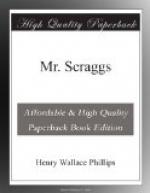“Inquire of the snake,” said Mr. Scraggs; “besides, he smelt awful. I don’t seem to be able to bring back any mornin’ I cared less for breakfast than that one. Suppose you was a happy rattlesnake, Charley, with a large and promisin’ fambly; suppose, now, on a frosty thirteenth of October you crawled under the cook-stove to get warm the minute the camp cook opened the door, and, before you limbered up enough to bite him, cooky lays cold and unfeelin’ hands upon you and Jams you into the stove—ain’t the number thirteen goin’ to carry unpleasant recollections for you from that on? Bet your life. Howsomever, these are only small details. My main proof that the number thirteen ain’t any better than it orter be lies in the fact that one day I married the thirteenth in Mrs. Scraggs. If I’d never’d hearn of such a thing I’d know’d thirteen was no good from that time on. This ain’t to cast reflections on the other Mrs. Scraggses, neither. I will say for them wimmen that anything simple-heartedness could do to prepare a man to meet his end cheerful they done. But Mehitabel the Thirteenth, of the reignin’ family of Scraggs, was a genius. Uncle Peter Paisley uset to say that a genius was a person that could take a cork and a dryness of the throat, and with them simple ingrejents construct a case of jim-jams. More than one-quarter of the time Uncle Pete knew what he was talkin’ about, too, and the rest of it he was too happy to care. Mehitabel was a sure-enough genius: she could make a domestic difficulty out of a shoestring, she could draw a fambly jar through a hole in a sock, and she could bring on civil war over the question of whether there was anything to quar’l about,
“Come Christmastime, I thought I’d leave home for a spell. There was an old friend of mine holdin’ down a mine out in the hills. I knew he wouldn’t have no company around, and I pined for solitude. There is a time in the affairs of men, as Shakespeare says, when a pair of cold feet beats any hands in the deck. Keno Jim said Shakespeare said so, and Shakespeare’s too dead to argue.
“‘So I puts on a pair of them long, slidin’ snowshoes they call ‘skees’ and slips for William Pemberton and the lonesome mountains. People don’t call a thing ‘skee’ unless they hev good reason for it. Before I caught the hang of them durn disconnected bob-sleds I saw where the ‘skee’ come in. The feller that loaned ’em to me kindly explained that you slid down the hills on ’em, and it was great sport. When I clumb the first hill and stood perspirin’ on top I felt entitled to a little sport. ‘Hooray!’ says I, and pushed loose. It was a long, wide, high hill with trees and things on it. Some time after I started, say about three seconds, I thought I’d like to slack a bit and view the scenery. The way I was travelin’ the scenery looked like the spokes of a flywheel. I left my stummick and my immortal soul about ten rods behind me. You could play checkers on my coat-tail, as the sayin’




